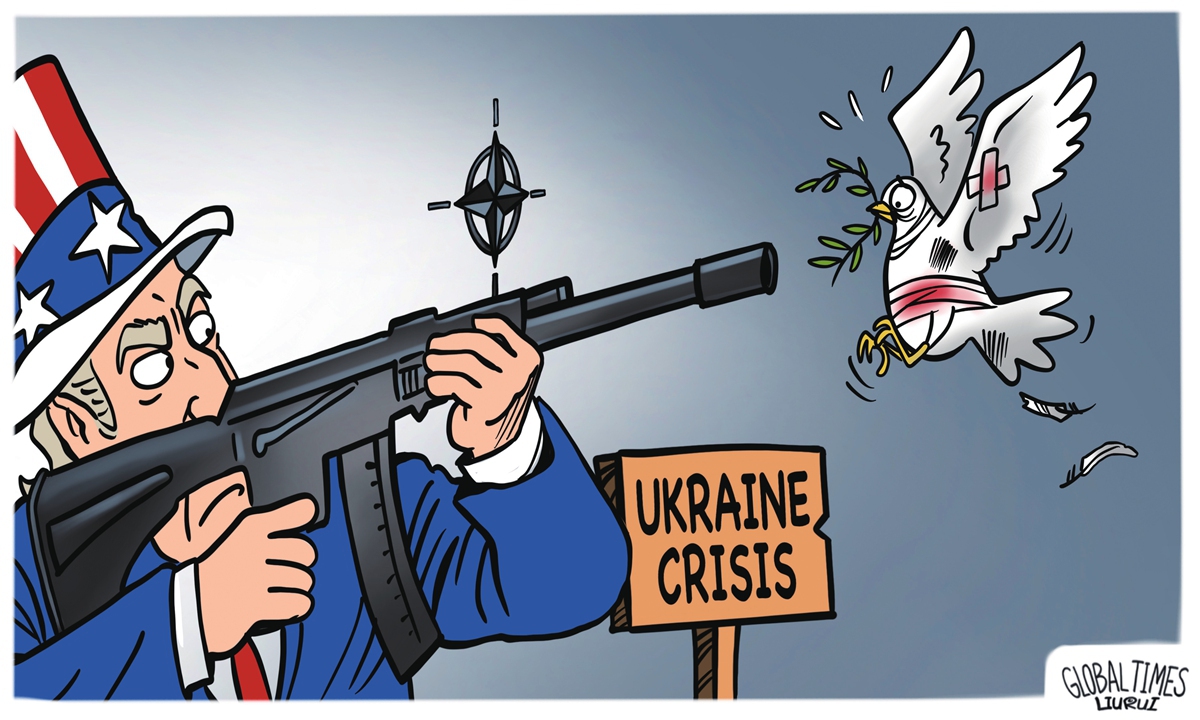
Threatening peace. Illustration: Liu Rui/Global Times
As Finland and Sweden officially applied for NATO membership, more divergences are emerging within the military bloc.Following Turkish President Recep Tayyip Erdogan's strong opposition to the two Nordic countries' NATO membership, Croatian President Zoran Milanovic said on Wednesday that he would instruct his country's permanent representative to NATO to vote "no" as well.
Milanovic said that Finland and Sweden should be allowed to join the organization only when the issue of equality of Croats in Bosnia and Herzegovina in elections is addressed. "That is not an act against Finland and Sweden but for Croatia," Milanovic insisted. Just like Erdogan's concern over the Kurdish issue, the Croatian president has also taken the opportunity to draw attention to an issue that specifically concerns his country.
In February, Milanovic told media that he's against NATO's expansion to Ukraine and anyone advocating it "threatens also Croatian interests." "While I'm the president, I will be opposed to NATO expanding anywhere," he added.
As NATO accelerates the entry of more countries in an attempt to strengthen the blockade of Russia, members of the organization have expressed their disagreement in various ways.
According to Sun Keqin, a research fellow at the China Institutes of Contemporary International Relations, Milanovic's stance might have been influenced by the Turkish president.
NATO Secretary General Jens Stoltenberg on Sunday expressed confidence in addressing Turkey's concerns.
All 30 NATO members have different security demands. NATO under the leadership of the US tries to play up the so-called Russia threat and realize Washington's geo-economic and geopolitical interests through ferocious expansion. However, US interests don't stand for the interests of individual NATO countries. As the Russia-Ukraine conflict continues and European countries bear more consequences of the war, many in NATO are gradually voicing their opposition, including putting forward their demands.
As one netizen quipped, "Why Turkey's consent can be so costly, while other's will probably be responded by no more than a simple 'Thank you.'"
The possibility cannot be ruled out that there could be similar reactions from political forces in other NATO countries.
Sun argued that since the transatlantic alliance has as many as 30 members, it is normal for these countries to have differences in interests due to their national conditions and positions in the organization. From another perspective, US persuasiveness among NATO members should not be overestimated.
NATO is asking its members to submit to Washington's interests in resisting Moscow, while ignoring these countries' interests. This is further intensifying the contradictions among different political forces within Europe and pushing the continent to greater uncertainty.
NATO's expansion has tied the interests of its members and even the entire European continent to the US chariot. The US intends to fundamentally weaken Russia, but many NATO countries don't agree that Russia is a security threat. Stability and development are the interests of most European countries.
The more aggressively NATO expands, the more cracks within the organization will be exposed.
The growing tension between the US and Russia will lead to bigger security risks for all NATO members. How many countries are willing to become cannon fodder for US interests?
"Certain countries are using their security demand to intensify the insecurity of Europe. They think that their security is guaranteed after they join NATO, but will only lead to the intensification of conflict between NATO and Russia - a result that will stimulate the possibility of a wider crisis or even conflict in Europe. It weakens the security of all countries," said the anonymous expert.
